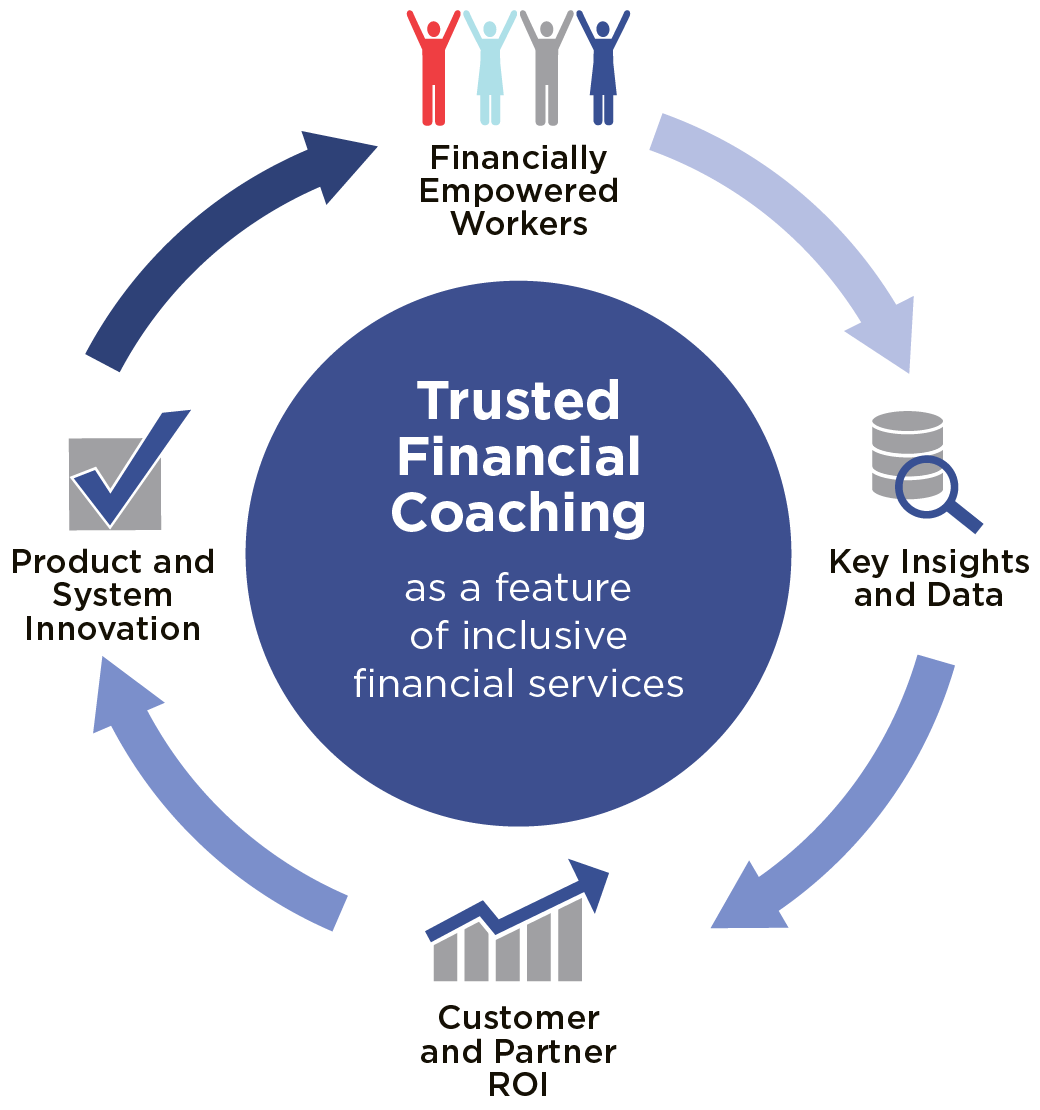Seeing Debt Clearly:
The Power of Our Impact Framework
Freedom from debt is the foundation on which workers build financial security and gain economic power.
Freedom from debt is the foundation on which workers build financial security and gain economic power.
 Throughout 2024, Neighborhood Trust made breakthrough progress in how we track, measure, understand, and disrupt debt for low-income workers. When we help workers eliminate debt, we deliver increased economic mobility, improved credit, more financial leverage, and less financial stress and vulnerability to exploitation. In other words, freedom from debt unlocks opportunity. It not only allows workers to keep more of their earnings to cover everyday expenses, it means personal and professional dreams—purchasing a home, saving for college, taking a family vacation—become within reach.
Throughout 2024, Neighborhood Trust made breakthrough progress in how we track, measure, understand, and disrupt debt for low-income workers. When we help workers eliminate debt, we deliver increased economic mobility, improved credit, more financial leverage, and less financial stress and vulnerability to exploitation. In other words, freedom from debt unlocks opportunity. It not only allows workers to keep more of their earnings to cover everyday expenses, it means personal and professional dreams—purchasing a home, saving for college, taking a family vacation—become within reach.

Throughout 2024, Neighborhood Trust made breakthrough progress in how we track, measure, understand, and disrupt debt for low-income workers. When we help workers eliminate debt, we deliver increased economic mobility, improved credit, more financial leverage, and less financial stress and vulnerability to exploitation. In other words, freedom from debt unlocks opportunity. It not only allows workers to keep more of their earnings to cover everyday expenses, it means personal and professional dreams—purchasing a home, saving for college, taking a family vacation—become within reach.
While Neighborhood Trust has made huge advancements in how we help workers gain freedom from debt, an ongoing challenge has been reaching greater scale in a landscape where no two workers’ debt is alike.
To reach more workers more efficiently, in 2024, we created a first-of-its-kind impact framework that accounts for the diverse and complex landscape of debt. The framework increases the power of our data and is designed to deliver insights that benefit the entire ecosystem of organizations working to solve for worker debt. Read on to learn about our inspiration for the framework, how it works, and what makes it so powerful.
CEO Perspective
Dear Friends,
Neighborhood Trust’s North Star is worker freedom from debt. We are insistent on eradicating debt because we see that it’s the canary in the coal mine of a broken economy. We’ve been working hard to eliminate indebtedness as a permanent fixture of workers’ lives, eager to transform our impact from one individual at a time, to tackling the problem at its root.
We’re grateful to Matthew Desmond, sociologist and author of Poverty, by America, for his eloquent articulation of poverty and exploitation that served as inspiration for this work.
“Poverty isn’t simply the condition of not having enough money. It’s the condition of not having enough choice and being taken advantage of because of that. … The exclusion of poor people from traditional banking and credit systems has forced them to find alternative ways to cash checks and secure loans, which has led to a normalization of their exploitation.”
In 2024, Neighborhood Trust engaged our clients and allies to help us build a new impact framework that surfaces, unpacks, and measures exploitation as the underlying cause of worker debt. This exploitation is systemic, with workers most vulnerable when their urgent need to meet basic or unexpected expenses makes them susceptible to predatory products promising quick fixes.
Neighborhood Trust is leading the way to suffocate the market for predatory and extractive financial products by building demand for inclusive alternatives from credit unions, CDFIs, and other mission-driven financial institutions. As we help more workers access inclusive financial services, we catalyze asset-building and build long-term worker power and leverage.
We seek to build a new profile of the American worker where assets, options, and power replace indebtedness, exclusion, and fragility.
The impact framework we’ve created allows us to see the drivers of worker debt, and the strategies to tackle each, more clearly. For Neighborhood Trust and our peers dedicated to helping workers build stronger financial lives, the framework isolates these indicators—like an improved credit score, or reduced debt, or better access to good financial products—and allows us to unpack what they mean for long-term financial security and mobility.
We know that losing less money to debt can have a profound impact on a person’s life. Even an extra one hundred dollars per month can be the key to avoiding an eviction, to saving for a move to a safer apartment, or to being able to contribute to a retirement plan or college savings fund. We know the difference this can make, because we’ve seen it firsthand. Our hope is that our new Impact Framework brings the long-term power of debt reduction into even sharper focus, empowering us to better understand workers’ needs, build more intentional interventions to resolve their pain points, and effect longer-term impact on the workers we serve.
I want to recognize the extraordinary work of our many partners, funders, and colleagues that have made entering this new frontier of measurement and accountability possible. I look forward to our data and insights program lifting up the power of this model to eradicate financial services exploitation.
In partnership,
Justine Zinkin
CEO Perspective
Dear Friends,
Neighborhood Trust’s North Star is worker freedom from debt. We are insistent on eradicating debt because we see that it’s the canary in the coal mine of a broken economy. We’ve been working hard to eliminate indebtedness as a permanent fixture of workers’ lives, eager to transform our impact from one individual at a time, to tackling the problem at its root.
We’re grateful to Matthew Desmond, sociologist and author of Poverty, by America, for his eloquent articulation of poverty and exploitation that served as inspiration for this work.
“Poverty isn’t simply the condition of not having enough money. It’s the condition of not having enough choice and being taken advantage of because of that. … The exclusion of poor people from traditional banking and credit systems has forced them to find alternative ways to cash checks and secure loans, which has led to a normalization of their exploitation.”
In 2024, Neighborhood Trust engaged our clients and allies to help us build a new impact framework that surfaces, unpacks, and measures exploitation as the underlying cause of worker debt. This exploitation is systemic, with workers most vulnerable when their urgent need to meet basic or unexpected expenses makes them susceptible to predatory products promising quick fixes.
Neighborhood Trust is leading the way to suffocate the market for predatory and extractive financial products by building demand for inclusive alternatives from credit unions, CDFIs, and other mission-driven financial institutions. As we help more workers access inclusive financial services, we catalyze asset-building and build long-term worker power and leverage.
We seek to build a new profile of the American worker where assets, options, and power replace indebtedness, exclusion, and fragility.
The impact framework we’ve created allows us to see the drivers of worker debt, and the strategies to tackle each, more clearly. For Neighborhood Trust and our peers dedicated to helping workers build stronger financial lives, the framework isolates these indicators—like an improved credit score, or reduced debt, or better access to good financial products—and allows us to unpack what they mean for long-term financial security and mobility.
We know that losing less money to debt can have a profound impact on a person’s life. Even an extra one hundred dollars per month can be the key to avoiding an eviction, to saving for a move to a safer apartment, or to being able to contribute to a retirement plan or college savings fund. We know the difference this can make, because we’ve seen it firsthand. Our hope is that our new Impact Framework brings the long-term power of debt reduction into even sharper focus, empowering us to better understand workers’ needs, build more intentional interventions to resolve their pain points, and effect longer-term impact on the workers we serve.
I want to recognize the extraordinary work of our many partners, funders, and colleagues that have made entering this new frontier of measurement and accountability possible. I look forward to our data and insights program lifting up the power of this model to eradicate financial services exploitation.
In partnership,
Justine Zinkin
Our Understanding of Debt Drives Our Approach
Neighborhood Trust considers debt as both a personal barrier and a systemic issue, where individuals face the quantitative weight of mounting debt, the qualitative effect when debt limits their ability to thrive, and a system that profits off their lack of good options and vulnerable financial position.
In working with our clients experiencing financial insecurity, we’ve seen firsthand how debt is their greatest pain point. Debt is a loaded and complex term, however, with no singular origin or solution. Consumer, medical, auto, and student debt each have unique causes, result in different degrees of harm, and require distinct interventions. Our Financial Coaches are well versed in the complexity of debt and how to target both the human experience and the exploitative systems that perpetuate financial hardship.
Across the broad spectrum of debt, Neighborhood Trust has zeroed in on predatory debt in particular because of its enormous negative impact on low-wage workers, undermining their financial security. Exploitative products cost workers significantly as they lose money to exorbitant fees and high interest, and harm them in the form of bad credit, lost financial leverage, and the stress and overload that comes as a result of being trapped in a cycle of debt.
Use the arrows to read all data points.
Use the arrows to read all data points.
Redefining Predatory Debt
Neighborhood Trust believes that eliminating the market for harmful, exploitative financial services requires a broader understanding of the products that cause the most harm. In 2024, we crafted a new definition of predatory debt as a product that exploits borrowers’ urgent financial needs, and is characterized by excessive costs, excessive or hidden fees, hidden or misleading repayment terms, weak underwriting, trapping mechanisms, and/or poor lender credibility. Equipped with this expanded definition, our Financial Coaches and the broader field can more effectively and systematically identify the wide range of debt products that carry a high risk of causing financial harm. Learn more in the first installment of our insight series, Predatory Debt: A New Definition and Why It Matters.
Redefining Predatory Debt
Neighborhood Trust believes that eliminating the market for harmful, exploitative financial services requires a broader understanding of the products that cause the most harm. In 2024, we crafted a new definition of predatory debt as a product that exploits borrowers’ urgent financial needs, and is characterized by excessive costs, excessive or hidden fees, hidden or misleading repayment terms, weak underwriting, trapping mechanisms, and/or poor lender credibility. Equipped with this expanded definition, our Financial Coaches and the broader field can more effectively and systematically identify the wide range of debt products that carry a high risk of causing financial harm. Learn more in the first installment of our insight series, Predatory Debt: A New Definition and Why It Matters.
From Vicious to Virtuous: Exploring Our Impact Framework
Our impact framework is the first of its kind that accounts for the diverse and complex landscape of debt and increases the power of our data. It demonstrates how we move workers from a vicious cycle of debt into a virtuous cycle of reduced debt, better cash flow and liquidity, and stronger credit.
In a vicious debt cycle, low-wage workers have little or no financial leverage and often rely on expensive, exploitative debt to make ends meet, worsening their financial situations.
Use the arrows to see different stages of the cycle.
Use the arrows to see different stages of the cycle.
The vicious cycle has painful real-world consequences, stripping low-wage workers of the hard-earned wages they could have used to pay for housing, food, childcare, medical care, and more. These challenges also block paths to economic mobility and generational wealth-building, with money that could have gone towards a safer home, better education, or entrepreneurship instead lost to fees and interest.
For workers living on the thinnest margins, taking on even one interest-bearing debt is enough to pull them into a vicious cycle of limited cash, high debt, and subprime credit.
Neighborhood Trust’s interventions disrupt the vicious cycle, helping clients overcome the barriers that have led to a demoralizing spiral of negative cash flow and mounting debt. From there, we help them enter a virtuous cycle, where we measure distinct interconnected outcomes—reduced debt, improved cash flow, improved balance sheets, better credit and access to good financial products, and increased feelings of power—that have the potential to build upon each other over time, and with increasing impact. The virtuous cycle maps and measures how clients amass greater leverage and negotiating power when they have better options, improved information, and greater feelings of agency and control.
Use the arrows to see different stages of the cycle.
Use the arrows to see different stages of the cycle.

Tailored Interventions
We provide our clients with a suite of interventions that disrupt the vicious cycle of debt, facilitated by expert Financial Coaches. Focused on tackling debt from all sides, these interventions are tailored to meet each worker’s needs and include matching someone to a helpful product from their local credit union, providing guidance on negotiating a collections account, and breaking ties with predatory products, among others.
Tailored Interventions
We provide our clients with a suite of interventions that disrupt the vicious cycle of debt, facilitated by expert Financial Coaches. Focused on tackling debt from all sides, these interventions are tailored to meet each worker’s needs and include matching someone to a helpful product from their local credit union, providing guidance on negotiating a collections account, and breaking ties with predatory products, among others.

Tailored Interventions
We provide our clients with a suite of interventions that disrupt the vicious cycle of debt, facilitated by expert Financial Coaches. Focused on tackling debt from all sides, these interventions are tailored to meet each worker’s needs and include matching someone to a helpful product from their local credit union, providing guidance on negotiating a collections account, and breaking ties with predatory products, among others.

“There are many ways to reduce debt! I tailor recommendations to each client’s situation to help them reach their goals and work toward financial freedom.
For example, I may suggest prioritizing maxed-out cards to lower their credit utilization—following the guidance of 30% utilization. This can boost their score and improve their chances of securing a consolidation loan with a better interest rate from their credit union, helping them save while paying down debt.”
Ana Paez, Senior Financial Coach

“There are many ways to reduce debt! I tailor recommendations to each client’s situation to help them reach their goals and work toward financial freedom.
For example, I may suggest prioritizing maxed-out cards to lower their credit utilization—following the guidance of 30% utilization. This can boost their score and improve their chances of securing a consolidation loan with a better interest rate from their credit union, helping them save while paying down debt.”
Ana Paez, Senior Financial Coach
Compound Impact: Fueling Lasting Change
The flip from vicious to virtuous cycles has a catalytic impact on long-term economic mobility, enabling our clients to hold onto more earnings to improve their quality of life, pursue asset-building opportunities, and become financially secure.
At the heart of our impact model is helping workers clear an essential barrier to meet one of the five defined outcomes in the virtuous cycle. As clients make progress in any one area, that momentum unlocks further growth and movement along the cycle, creating a compounding effect over time and life-changing improvements in a worker’s financial future.
Use the arrows to see different stages of impact.
Use the arrows to see different stages of impact.

“The practical and inspirational impact of going from a subprime to a super-prime credit score cannot be overstated. One client came to me with rental arrears and a credit score of 613. As a result of our work together, her score increased to 814, opening up new possibilities. She had felt stuck in an undesirable apartment and knew that a low credit score would limit apartment approvals. Now, with a high credit score and confidence in her ability to manage credit, she is imagining a new home.”
Denae Hannah, AFC®, Senior Financial Coach

“The practical and inspirational impact of going from a subprime to a super-prime credit score cannot be overstated. One client came to me with rental arrears and a credit score of 613. As a result of our work together, her score increased to 814, opening up new possibilities. She had felt stuck in an undesirable apartment and knew that a low credit score would limit apartment approvals. Now, with a high credit score and confidence in her ability to manage credit, she is imagining a new home.”
Denae Hannah, AFC®, Senior Financial Coach
A Clearer Picture of Progress
Our virtuous cycle framework allows us to capture a deeper, more nuanced view of each client’s journey. While each of its five outcomes can be measured individually by different indicators (e.g., elimination of collections accounts, savings account balance), no single metric fully captures a program’s effectiveness in helping workers eliminate debt. Once an individual has entered the virtuous cycle, their progress toward freedom from debt is likely going to be reflected across multiple interconnected metrics, and this framework helps us to capture those successes.
By collecting a fuller picture of each client’s financial life, we can not only more effectively target our interventions, but we can also begin to understand how various data points correlate, helping us map common pathways out of debt so we can scale and more effectively serve more workers. For example, we are prioritizing the way our data shows the impact of swapping a predatory debt product for a lower-interest alternative from a credit union or CDFI.
The Data Powering Our Impact Framework
Using the virtuous cycle as a framework, Neighborhood Trust is able to identify trends and zero in on the interventions that most effectively reduce workers’ reliance on debt. The more data we collect, the more we can equip our Financial Coaches with detailed metrics to inform their recommendations, and share our learnings with the larger field of organizations helping workers build more financially stable futures.
In 2024 we invested in an updated infrastructure and methodology to collect and measure data within the virtuous cycle.
Processes that were previously manual—such as collecting client financial information via coaching sessions and email surveys—have been streamlined and automated. For example, Financial Coaches can now receive data directly from clients’ bank accounts when their clients opt into sharing that information with us. This allows them to scan clients’ transactions for harmful products that meet our definition of “predatory”—helping to easily spot these products and begin seeking alternatives. We also have a new, systematic way to assess improvements in worker financial self-efficacy.
Recent measurement and analytics upgrades include:
![]()
UPDATED CREDIT REPORT METHODOLOGY
Our new credit review methodology equips Financial Coaches with the info they need to flag predatory products that they see on clients’ credit reports and prioritize replacing those products
![]()
INSTANT FINANCIAL SNAPSHOT
A new “Financial Snapshot” report is immediately provided to clients upon linking their bank account and provides a personalized scan of high-cost and predatory financial products.
![]()
NEW CLIENT INTAKE FORM
Revamped client intake and follow-up surveys enable us to assess our qualitative indicators such as self-efficacy.
![]()
NEW BANK TRANSACTION AGGREGATOR
A new Bank Transaction Aggregator (FinGoal) gives us more insight into cash flow, debt spending, income volatility, and savings habits.
The Data Powering Our Impact Framework
Using the virtuous cycle as a framework, Neighborhood Trust is able to identify trends and zero in on the interventions that most effectively reduce workers’ reliance on debt. The more data we collect, the more we can equip our Financial Coaches with detailed metrics to inform their recommendations, and share our learnings with the larger field of organizations helping workers build more financially stable futures.
In 2024 we invested in an updated infrastructure and methodology to collect and measure data within the virtuous cycle.
Processes that were previously manual—such as collecting client financial information via coaching sessions and email surveys—have been streamlined and automated. For example, Financial Coaches can now receive data directly from clients’ bank accounts when their clients opt into sharing that information with us. This allows them to scan clients’ transactions for harmful products that meet our definition of “predatory”—helping to easily spot these products and begin seeking alternatives. We also have a new, systematic way to assess improvements in worker financial self-efficacy.
Recent measurement and analytics upgrades include:
![]()
UPDATED CREDIT REPORT METHODOLOGY
Our new credit review methodology equips Financial Coaches with the info they need to flag predatory products that they see on clients’ credit reports and prioritize replacing those products
![]()
INSTANT FINANCIAL SNAPSHOT
A new “Financial Snapshot” report is immediately provided to clients upon linking their bank account and provides a personalized scan of high-cost and predatory financial products.
![]()
NEW CLIENT INTAKE FORM
Revamped client intake and follow-up surveys enable us to assess our qualitative indicators such as self-efficacy.
![]()
NEW BANK TRANSACTION AGGREGATOR
A new Bank Transaction Aggregator (FinGoal) gives us more insight into cash flow, debt spending, income volatility, and savings habits.
Strengthening Financial Self-Efficacy
Neighborhood Trust’s “virtuous cycle” concept sets itself apart from other debt measurement frameworks by including worker self-efficacy as an outcome. Financial self-efficacy refers to an individual’s perception of their ability to influence and manage their financial lives.
Systemic inequalities have left workers with insufficient income and cash flow for basic needs vulnerable to predatory financial products. The debt cycle that often results can be demoralizing and fuel feelings of powerlessness or being stuck. With increased self-efficacy, workers feel capable and empowered to overcome systemic exploitation and regain control of their finances. Developing and acting on this increased self-efficacy is a critical component of achieving financial well-being, alongside access to better products that enable workers to break the debt cycle and balance cash flow.
Rosie Silber-Marker, our Senior Manager of Worker Insights, shares her perspective on why strengthening self-efficacy is essential to advancing impact:
Why is self-efficacy integrated into the impact framework?
Research shows that workers with higher self-efficacy are more likely to take action to master their financial challenges. At the same time, as indicators like credit score or cash flow improve, so does worker confidence and power. Neighborhood Trust is leading the way in how we combine financial data and subjective insights to measure and learn from worker experiences.
In what ways can self-efficacy support workers overwhelmed by debt?
We want to make the case for why addressing self-efficacy is critical to long-term progress toward freedom from debt. Neighborhood Trust’s model works by combining good products with trusted, client-centered, financial guidance. There is a human side to guiding workers toward financial freedom, and it includes helping them to both recognize the exploitative system designed to trap them, and to believe in their ability to take action to escape the vicious cycle for good. We believe that financial self-efficacy is a crucial measure of success in effective debt reduction programs.
Rosie Silber-Marker, our Senior Manager of Worker Insights, shares her perspective on why strengthening self-efficacy is essential to advancing impact:
Why is self-efficacy integrated into the impact framework?
Research shows that workers with higher self-efficacy are more likely to take action to master their financial challenges. At the same time, as indicators like credit score or cash flow improve, so does worker confidence and power. Neighborhood Trust is leading the way in how we combine financial data and subjective insights to measure and learn from worker experiences.
In what ways can self-efficacy support workers overwhelmed by debt?
We want to make the case for why addressing self-efficacy is critical to long-term progress toward freedom from debt. Neighborhood Trust’s model works by combining good products with trusted, client-centered, financial guidance. There is a human side to guiding workers toward financial freedom, and it includes helping them to both recognize the exploitative system designed to trap them, and to believe in their ability to take action to escape the vicious cycle for good. We believe that financial self-efficacy is a crucial measure of success in effective debt reduction programs.
Results that Matter:
2024 Impact Highlights
In 2024, Neighborhood Trust served over 7,200 workers across 47 states. In partnership with our 70 TrustPlus and Pathways to Financial Empowerment customers (which include employers, national worker organizations, fintechs, credit unions, and nonprofits), we catalyzed meaningful financial outcomes for our clients.

Results that Matter:
2024 Impact Highlights
In 2024, Neighborhood Trust served over 7,200 workers across 47 states. In partnership with our 70 TrustPlus and Pathways to Financial Empowerment customers (which include employers, national worker organizations, fintechs, credit unions, and nonprofits), we catalyzed meaningful financial outcomes for our clients.

Results that Matter:
2024 Impact Highlights
In 2024, Neighborhood Trust served over 7,200 workers across 47 states. In partnership with our 70 TrustPlus and Pathways to Financial Empowerment customers (which include employers, national worker organizations, fintechs, credit unions, and nonprofits), we catalyzed meaningful financial outcomes for our clients.

Shaping the Future of Freedom from Debt
With 2025 underway, we are intensifying our data collection and analysis across the virtuous cycle. We are closely monitoring how the market, employers, and workers respond to our new political and economic climate. With our framework and data collection mechanisms firmly in place, we are prepared to track how systemic changes impact worker realities, enabling us to respond in real time.
As more data comes in, we expect clear trends and patterns to emerge. This clarity will help us identify new powerful interventions and share compelling stories that bring to light how financial exploitation leads to pain for workers, communities, and our economy as a whole.
2025 is about keeping more workers safe from financial harm, especially those most vulnerable, and continuing to shift the market away from predatory and exploitative products. It will also be the first in a multi-year effort to use the power of our growing platform of workers and mission-driven financial institutions to create a more inclusive financial services ecosystem. We invite our partners and allies to join us as we:
- Grow to serve many more people across the country, delivering our financial coaching through new channels that are allied with our mission for worker empowerment.
- Use our data and community partnerships to ensure we’re reaching workers who are struggling the most, and for whom our solutions can have the most powerful impact.
- Build a national platform that helps workers eliminate and avoid predatory financial services by matching them with inclusive financial products, embracing local credit unions designed to meet the needs of their communities.
- Build a robust data set that makes the case for financial inclusion and security as essential to a healthy society.

Neighborhood Trust seeks to eliminate the barrier of debt and predatory financial services from the lives of low-wage workers through our rapid growth as a social enterprise. Keep in touch and follow along on our journey.

Neighborhood Trust seeks to eliminate the barrier of debt and predatory financial services from the lives of low-wage workers through our rapid growth as a social enterprise. Keep in touch and follow along on our journey.







Follow Us